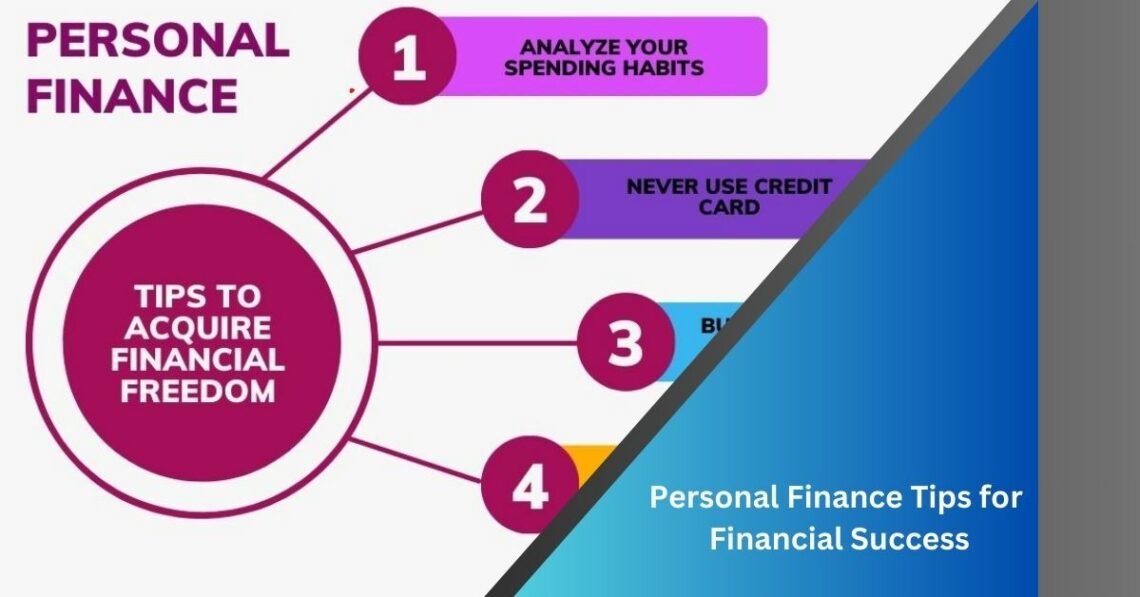
Personal Finance Tips for Financial Success
Personal finance is a journey that requires careful planning, strategic decision-making, and a commitment to lifelong learning. Achieving financial success is not about luck; it’s about making informed choices and adopting healthy financial habits. In this article, we’ll explore key tips for managing your finances effectively.
Table of Contents
ToggleIntroduction
Importance of Personal Finance
In a world driven by financial uncertainties, having a solid grasp of personal finance is crucial. It empowers individuals to navigate economic challenges, plan for the future, and achieve their financial goals.
Setting Financial Goals
The first step toward financial success is setting clear and achievable goals. Whether it’s buying a home, funding education, or retiring comfortably, having defined objectives provides direction to your financial journey.
Budgeting Basics
Creating a Budget
A budget is the foundation of sound financial management. Start by tracking your income and expenses to understand your spending patterns. Create a budget that allocates funds for essentials, savings, and discretionary spending.
Tracking Expenses
Regularly monitor and categorize your expenses. This helps identify areas where you can cut costs and allocate more funds towards savings or debt repayment.
Emergency Fund
Establishing an emergency fund is a critical aspect of financial planning. It serves as a financial safety net, providing peace of mind and protection against unexpected expenses.
Managing Debt
Understanding Types of Debt
Not all debt is created equal. Distinguish between good and bad debt, and develop strategies for managing and repaying outstanding balances.
Debt Repayment Strategies
Explore various debt repayment methods, such as the snowball or avalanche method, to efficiently pay off debts and work towards financial freedom.
Building an Emergency Fund
Importance of Emergency Funds
Life is unpredictable, and unexpected expenses can arise at any time. Learn why having an emergency fund is essential for financial stability.
Strategies to Build an Emergency Fund
Discover practical ways to build and maintain an emergency fund, ensuring you’re prepared for unforeseen circumstances without compromising your financial goals.
Investing Wisely
Types of Investments
Explore different investment options, including stocks, bonds, and real estate. Understand the risks and returns associated with each to make informed investment decisions.
Risk and Return
Balancing risk and return is key to successful investing. Diversify your investment portfolio to minimize risk while maximizing potential returns.
Diversification
Spread your investments across different asset classes to protect your portfolio from market fluctuations.
Retirement Planning
Importance of Planning for Retirement
Start planning for retirement early to secure a comfortable and stress-free future. Understand the various retirement savings options available.
Retirement Savings Options
Explore retirement savings accounts, such as 401(k)s or IRAs, and take advantage of employer-sponsored plans to build a robust retirement fund.
Credit Score Management
Understanding Credit Scores
Your credit score plays a crucial role in financial decisions. Learn how credit scores are calculated and the factors that influence them.
Improving and Maintaining Credit Scores
Discover practical strategies to boost your credit score and maintain a healthy credit history.
Financial Education
Continuous Learning
Stay informed about personal finance trends and market developments. Continuously educate yourself to make informed financial decisions.
Staying Informed About Market Trends
Keep abreast of economic trends and market shifts to make proactive adjustments to your financial strategies.
Frugal Living
Smart Spending Habits
Adopt frugal living habits by making conscious spending choices. Differentiate between needs and wants to optimize your budget.
Cutting Unnecessary Expenses
Identify and eliminate unnecessary expenses to free up funds for savings and investment.
Financial Independence
Achieving Financial Freedom
Strive for financial independence by creating multiple income streams and reducing reliance on a single source of income.
Creating Multiple Income Streams
Explore side hustles, investments, or passive income opportunities to diversify your income streams.
Tax Planning
mportance of Tax Planning
Maximize your financial efficiency by understanding the basics of tax planning. Explore legal ways to minimize tax liabilities.
Maximizing Tax Efficiency
Take advantage of tax deductions, credits, and other incentives to optimize your tax strategy.
Regular Financial Checkups
Reviewing and Adjusting Financial Plans
Regularly assess your financial goals and adjust your plans as needed. Flexibility is key to adapting to changing circumstances.
Seeking Professional Advice
Consider consulting financial experts for personalized advice and guidance tailored to your unique financial situation.
Teaching Children About Money
Importance of Financial Education for Kids
Equip children with essential financial skills by teaching them about money from a young age.
Practical Ways to Teach Children About Money
Instill financial literacy through real-life experiences, allowances, and age-appropriate discussions about budgeting and saving.
Mindful Money Management
Balancing Enjoyment and Financial Responsibility
Find a balance between enjoying life and being financially responsible. Allocate funds for both pleasure and long-term goals.
Avoiding Impulse Purchases
Combat impulse purchases by implementing strategies like creating a shopping list and sleeping on major buying decisions.
The Road to Financial Success
Celebrating Milestones
Acknowledge and celebrate financial milestones, reinforcing positive habits and motivating continued progress.
Staying Motivated on the Financial Journey
Stay motivated by reflecting on your financial goals regularly. Remember that financial success is a journey, not a destination.
Conclusion
Incorporating these personal finance tips into your life can pave the way for financial success. By budgeting wisely, managing debt, investing strategically, and staying informed, you can achieve your financial goals and build a secure future.
FAQs
How can I start budgeting if I’ve never done it before?
Begin by tracking your expenses for a month to understand your spending habits. Create a budget based on your income and allocate funds for essential categories.
Why is an emergency fund important, and how much should I save?
An emergency fund provides financial security during unexpected events. Aim to save at least three to six months’ worth of living expenses to cover unforeseen circumstances.
What are the benefits of diversifying my investment portfolio?
Diversification helps minimize risk by spreading investments across different asset classes. This strategy can enhance potential returns while safeguarding against market volatility.
When should I start planning for retirement?
It’s never too early to start planning for retirement. The earlier you begin, the more time your investments have to grow, increasing your retirement fund.
How can I improve my credit score?
Improve your credit score by paying bills on time, reducing outstanding debts, and monitoring your credit report for errors.
You May Also Like

Navigating the Stock Market for Beginners
December 28, 2023
Sports Guru Pro Blog – Everything You Need To Know!
December 1, 2023

